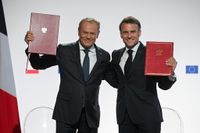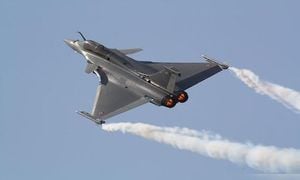On May 9, 2025, in a historic step for European security, French President Emmanuel Macron and Polish Prime Minister Donald Tusk signed a treaty in Nancy aimed at enhancing cooperation and friendship between their nations. The treaty, which includes a crucial provision for mutual assistance in the event of threats, marks a significant development in the relationship between Poland and France amidst growing regional tensions.
During a joint press conference, Macron stated that if Poland were to face an attack, France could mobilize its military forces within 30 days. He expressed confidence in France's ability to deploy troops quickly, citing the country's constitutional decision-making framework and military organization. "I have no doubt that such deployment would be possible if the worst were to happen," he affirmed. This assertion reflects the urgency of the current geopolitical climate, particularly in light of Russia's aggression in Ukraine.
The signing of the treaty signifies a commitment from both nations to not only strengthen their bilateral ties but also to bolster the European pillar of NATO. Macron emphasized the importance of this alliance, stating, "Both our countries are covered by Article 5 of NATO," which mandates collective defense. He highlighted the necessity of enhancing European defense capabilities to reduce dependency on external decisions.
Tusk echoed Macron's sentiments, asserting that the treaty opens opportunities for collaboration in key defense technologies, including nuclear capabilities. He remarked, "This treaty is not a place for writing contracts, but we have clearly declared that Poland and France will strengthen cooperation in defense industries. Both sides have much to offer, and we take this very seriously." Tusk underscored that the treaty is a response to historical lessons, aiming to build a strong military partnership that does not merely seek security guarantees but actively supports each other.
Macron further elaborated on the treaty's implications, stating that it opens a "new chapter in history" and supports European ambitions for industrial sovereignty. He mentioned the significance of this agreement in fostering economic cooperation, including an annual bilateral economic forum and high-level dialogues on civil nuclear energy. Macron expressed hope that the Polish-French relationship would contribute to a united, strong, sovereign, and competitive Europe.
In discussing the current security landscape, Macron noted the ongoing challenges posed by Russian aggression, which has threatened peace and stability in Europe for over a decade. He stated, "We bear a primary responsibility for peace and security on our continent," highlighting the need for a collective European response to these threats. The treaty, according to Macron, reinforces the commitment to supporting Ukraine in its struggle for sovereignty and stability.
After the signing of the main treaty, a second document was also signed, focusing on cooperation in civil nuclear energy. This aspect of the agreement underscores the importance of energy security in the context of European defense and industrial collaboration.
As both leaders concluded their remarks, they expressed a shared vision for the future of Polish-French relations. Macron stated, "We want to raise Polish-French relations to a higher level than ever before," while Tusk reiterated the importance of tangible outcomes from their partnership. He emphasized that the safety of their nations relies not only on words but on the concrete actions taken to ensure mutual security.
This treaty marks a pivotal moment in European defense policy, reflecting a growing recognition among European nations of the need for solidarity and cooperation in the face of external threats. As Europe navigates a complex security environment, the partnership between Poland and France may serve as a model for enhanced collaboration among NATO allies.
In summary, the Polish-French treaty signed on May 9, 2025, is a landmark agreement that strengthens military and economic ties between the two nations. It underscores a commitment to mutual defense and positions both countries as proactive contributors to European security. As the geopolitical landscape continues to evolve, this partnership may play a crucial role in shaping the future of defense cooperation in Europe.




